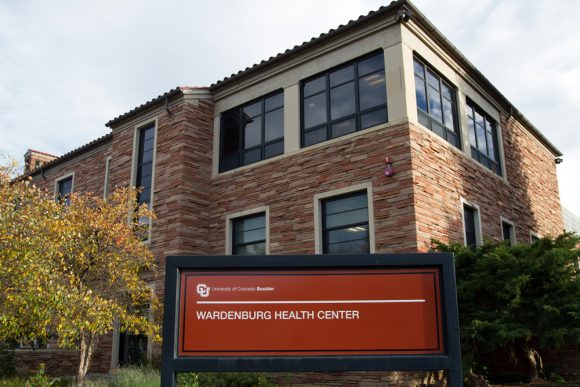
The Wardenburg Health Center on the University of Colorado Boulder campus. (Andrew Scales/CU Independent file)
On Aug. 6, the University of Colorado, Boulder made the decision to phase out COVID-19 monitoring testing for the entirety of the campus. During the fall and spring semesters of the 2020-2021 school year, students were encouraged to take monitoring tests at locations across campus. Now, that program has been shut down.
Monitoring testing has been a useful tool for colleges across the country as the pandemic continues to affect vulnerable communities. This form of testing helps prevent widespread outbreaks of disease by testing asymptomatic individuals on a regular basis, and it is most effective when there is a high rate of participation.
So why did CU Boulder decide the phase out this form of testing? The answer is simple: vaccine mandates. According to Melanie Parra, Director of Communications for CU Boulder, with vaccines becoming widely available during the summer, the university decided that through a vaccine mandate, cases across campus would go down significantly. Parra claims that this sort of “widespread outbreak” monitoring is unnecessary.
The university believes that this gamble has paid off. With over 90% of students and employees vaccinated across campus, the university has had only 23 positive cases out of the 1,684 voluntary diagnostic tests taken these past two weeks.
Due to this high vaccination rate and the widespread availability of the vaccine, the university has no plans to bring back monitoring testing, even as the Delta variant has caused an increase in cases across Colorado. According to Dr. Arturo Barbachano-Guerrero, a post-doctorate associate specializing in epidemiology, that isn’t a bad thing.
“You have to prioritize what questions you want to investigate,” said Barbachano-Guerrero. “Is this something [the university] wants to keep on doing?”
In a perfect world, Barbachano-Guerrero said longitudinal testing, where everyone in the community is tested would be the norm. “But the question is, is it necessary?” he said.
When it comes to monitoring testing, Dr. Barbachano-Guerrero says that “Given that 95% of people are vaccinated, I don’t think it’s required. It would’ve been worse if we had no testing last year.”
If you show symptoms of the virus or may have had a known exposure to COVID-19, there is still diagnostic testing available through the Public Health Clinic, according to Parra.
Those who want to get tested will be able to meet with a provider to assess their symptoms and provide “the best care and tests for their situation,” Parra said. Asymptomatic students who are still concerned they may have been exposed can schedule an appointment through the MyCUHealth portal.
For more information regarding CU’s decision to end monitoring testing, you can watch the university’s update on its continuing response to the COVID-19 pandemic here.
Contact CU Independent Staff Writer William Oster at william.oster@colorado.edu.
